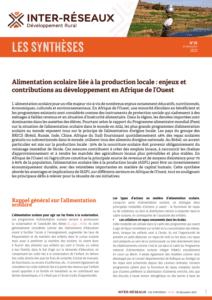As an English-speaking country that enjoys political stability and favourable conditions (particularly economic), and that has made great strides in its democratic governance, Ghana appears at first glance to be the exception in West Africa. In addition to attracting investors, the country is a driving force for regional integration.
But what about the country’s model for agricultural development, often referred to as liberal? What policy programmes are guiding its trajectory? How are Ghana’s agricultural sectors organised, and who are the key players? What challenges do they face?
This special edition features articles by a wide variety of contributors with different points of view, and explores the paradox of an emerging country that still has major structural weaknesses. Ghana’s agricultural sector is considered to be a driver of economic growth. Relying heavily on export crops, such as cocoa, the sector is guided by the government’s liberal vision, which places great emphasis on the private sector. But despite Ghana’s “success”, the country still faces a number of challenges, such as prevalence of hunger (5.5%), low agricultural productivity and degradation of natural resources.
This issue of Grain de Sel also has a new layout, and now features a “Portrait” section with articles on different actors.
The magazine is also available in French and with an interactive Flipbook version
Feel free to send feedback or comments to inter-reseaux@inter-reseaux.org
We hope you enjoy this edition of the magazine!
The Inter-réseaux team
Download Grain de Sel (PDF, 44 p., 7335 ko) Here
Go to the interactive Flipbook version by clicking
Grain de Sel is a half-yearly magazine published by Inter-réseaux Développement Rural. Each issue focuses on a specific topic in order to encourage discussion and debate between a wide variety of people with different points of view. More than 5,000 paper copies are distributed, and a digital version is emailed to more than 10,000 subscribers. Click here to subscribe!
Want to contribute to the magazine? Send us a message at veille@inter-reseaux.org to share your experiences and opinions.








